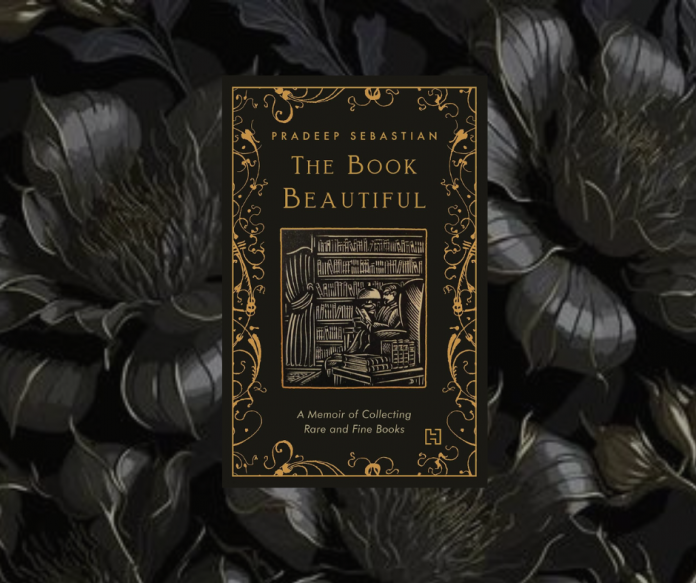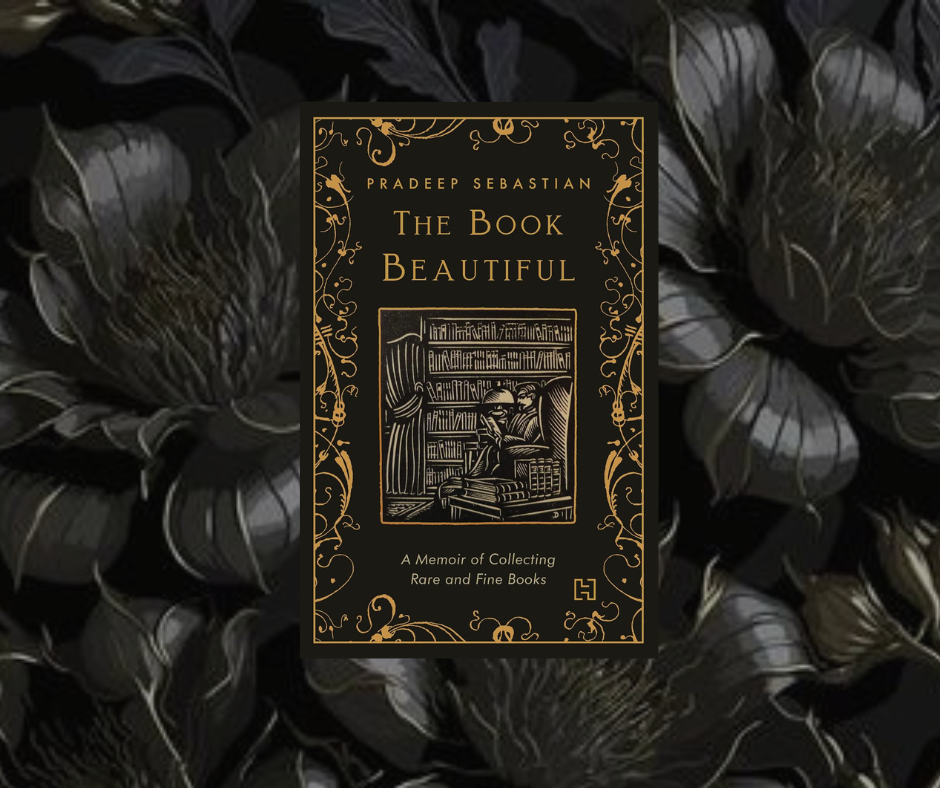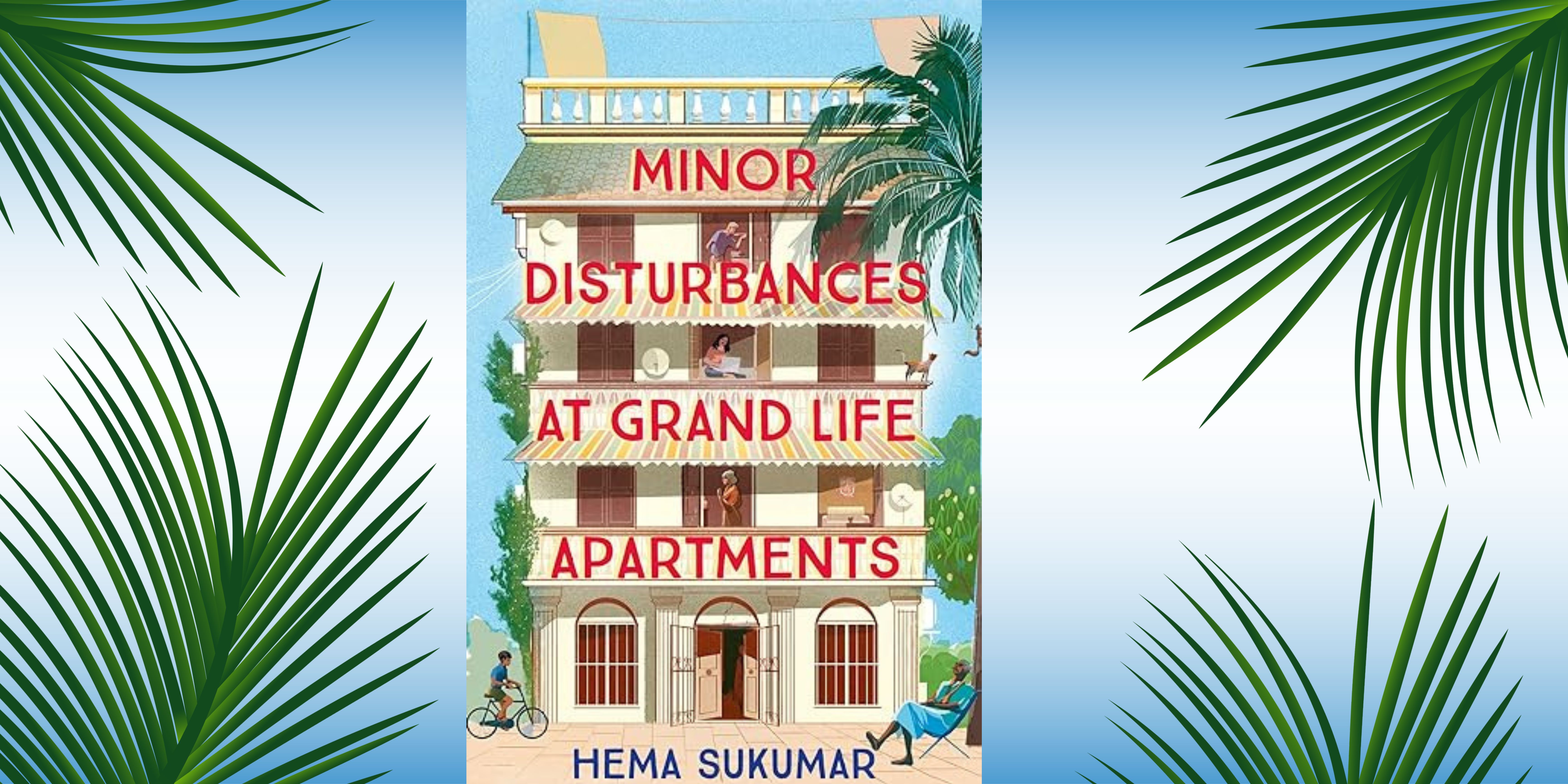The Book Beautiful
by Pradeep Sebastian
Publisher: Hachette India (2023)
The Book Beautiful- A memoir of collecting rare and fine books (TBB), at least on the Indian literary scene, is one of a kind, possibly the only one of its kind. A book about books, this is book-love in its purest and most intimate form. Bibliophilia sounds a bit scientific to describe it. Some would argue it teeters on the edge of ‘philia’, threatening to cross over onto ‘mania’, but book lovers know better. No amount of book love is ever ‘more’.
TBB, as the author puts it, is about collecting fine books and manuscripts, with a particular focus on the book arts, as experienced by an impecunious collector who mainly book-hunts online – browsing, negotiating, and buying from rare booksellers on the internet. It’s also about the thrill of the chase, the pursuit of the juiciest rare book bargain, the camaraderie of fellow collectors and the friendship of bookdealers. There are profiles of antiquarian dealers, fine press collectors, fine press printers, favourite writers on bibliophily, favourite books about collecting and dealing, and other tales of adventures in collecting. Sebastian has described the two kinds of pleasures in the book — the pleasure of collecting and the pleasure thus collected fine books gave to him. Sebastian confesses that some of the most enjoyable moments are when you make great find or locate a fabulous bargain.
Initially Sebastian was a collector of first editions of books, signed by the authors. Once that signed first edition arrives, and after a customary check-up that it is indeed a first impression, the collector observes that it has a fine original dust jacket, feels a twinge of a thrill at seeing the manuscript hand of one’s favourite writer, the book is stowed away with many others. That’s that. For Sebastian, there didn’t seem to be much more to collecting first editions than rarity, chronological priority, and condition, and it soon lost its charm for him. It wasn’t that he didn’t get the mystique of first editions, it’s just that they were never able to engage him with any intensity. And then he found fine press books. Fine press books aka private press books are printed with letterpress, that is, from metal type impressed into handmade paper.
Sebastian writes: “What I can, or would like to tell you is this: until you’ve known the sensual, typographic beauty of a finely printed letterpress book, you’ve never really handled or owned a real book. ‘Put simply, said typographer Robert Bringhurst, ‘the difference between the two technologies is this: letterpress is printing, offset is a picture of printing.’”
The author realizes that he needed to go further back, to the very beginning of fine bookmaking — to manuscript making. It was then that his collecting focus shifted from private press books to manuscript illumination. His interest went further back from the birth of the printed book in the fifteenth century to manuscript making from the sixth to the fourteenth century. Fine press books became the gateway for him to collect other forms of books and manuscripts — the extra illustrated book, the leaf book, emblem books, bookplate books, colour plate books, large paper copies, fore-edge painted books, original hand-drawn calligraphic manuscripts, and the one he ended up becoming the most besotted with, illuminated manuscripts.
It was only as recently as in 2015 that Sebastian began collecting rare and fine books in a serious way. Though a bibliophile all his life, he had never felt the temptation to become a book collector. He was content to just stand on the periphery and cheer the bibliomania of others. That changed when he began to come across books the likes of which he’d never seen or handled before: books printed on a handpress from beautiful metal type immaculately pressed into dampened handmade paper, books where the illustrations were hand coloured or wood-engraved, manuscripts that were calligraphically written out (not printed) in an exquisite scribal hand and finally, most ravishing of all, illuminated manuscripts — medieval and modern — that were hand-painted in burnished gold and colours.
Like a crafty collector, Sebastian leaves tips for upcoming book collectors. He writes: ‘Connoisseurship in collecting is also about recognizing that what looks or feels like a high price (for something you are interested in from a dealer’s listing) could well be a fair price.’ Many times in the book he laments upon letting go a book at a price that he thought was out of his budget, only to realize after a months that it was, in fact, a steal deal. These are the moments when the book really opens up to the reader, for we partake in Sebastian’s sorrow and his aphorisms: it is what you let go hounds you more than what you have achieved. Sebastian writes that although he has found many rare bibliophilic gems from dealers at satisfactory and throwaway prices, it was the books that slipped through the cracks that dance in front of his very eyes day and night.
Clearly not for everyone, TBB is a book for those whose top 3 idea of gifts are books, books, and well, books. A treat for bibliophiles, TBB comes alive in Sebastian’s joy and frustration. His sincerity and love for books is as illuminated here as the illuminated manuscripts he collects from all over the world while sitting in his home.
Love is infectious. More so when it is bibliophilia. While reading TBB, I imagined it to be a huge bed with pages making up the bedsheets and the blankets, the small of book wafting through my nostrils, the creamy glow all around me. How snug I felt reading it! Some places it felt a bit tiring with a gamut of historical presses and collectors thrown in again and again, but, for most parts, it is fun and satisfying. Just like sleeping in a sea of books. One last hurray for the glorious book cover. Black and gold make up magic together.
Happy Reading.







RELATED ARTICLESMORE FROM AUTHOR
Kashmir: A Valley That Goes Beyond Personal Anger
Open Book : Not Quite a Memoir
The Gorakhpur Hospital Tragedy: A Doctor’s Memoir of a Deadly Medical Crisis